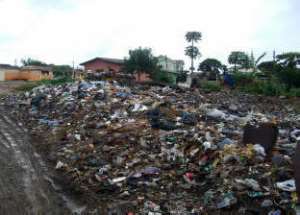
Do you know the amount of waste in kilograms you personally produce each day? What about where the waste you produce goes to be deposited finally?
And an average Ghanaian produces about 0.51kg of waste per day, this is according to research by the World Bank published in the what a waste 2.0
report on global waste generation and management, while Sub Saharan Africa generates in all about 174million tonnes of waste in 2016 alone. This figure is expected to triple by 2050 with the growing trends of populations in the region.
While this figure may look quite minimal when considered on individual basis, it's estimably huge when considered in the grand scheme of the population of the entire country.
It's May, and June is around the corner; torrential rain, choked gutters, an almost clueless meteorological agency and a painfully ill-equipped disaster management organization admix to compound the woes of Ghanaians in flood prone areas.
The volumes of waste produced each day, for now, can't be reduced especially with increasing population trends, it can only see an upsurge, while this can be a curse if left unmanaged, it's a blessing in disguise. When we continue to waste as we do in this country, we can't pay good attention to the economic value it brings; in his state of the nation's address earlier this year, the President projected a revenue generation of about 2 billion Ghana Cedis annually from recycling plastic wastes.
While creating lots of jobs, he also mentioned that about 82% of plastic wastes will be recovered
and recycled into value-added products for the sub-region. While this is quite ambitious, it's a commendable projection in dealing with waste.
We must be more innovative with on the ground waste collection to start with; waste must be well compartmentalized from homes and streets even before being disposed of.
Comparing North America to Subsaharan africa, a population of 359million as at 2016, produced almost twice the waste produced by the 1.03 billion people in sub-Saharan Africa. This points out a very important fact, that is, the challenge with waste is not it's volume of generation but the end use of the waste.
Most developed countries produce more waste, but they have management technology and tools to match the generation, reason why there is little or no littering.
Majority of waste produced globally is from organic sources, food and green wastes, about 43% of global waste. This is an opportunity for young people in technology and climate-smart agriculture startups to capitalize on manure and organic fertilizer production.
Phone apps for such as "I got waste" developed and used by a startup in India can be developed to track the production, collection, disposal and hence the reuse of these organic wastes. This will
require the readiness of venture capitalists and government to invest in startups who are willing to venture into waste management.
The end uses of waste are innumerable though it's effects when left poorly managed is dire, the opportunities are
limitless if heed can be paid to the dynamics of waste generation and management.
Its more expensive to the natural environment than it is to recycle and reuse waste if the consideration for a good waste recycling regime is solely financial implications.
Most waste produced in the country ends up in the natural environment, soil, water bodies and so on, causing an increase in greenhouse gas emissions thereby increasing mean surface temperatures.
Recently I read on BBC news portal about how a whale has washed ashore and 26kg of plastic waste was discovered in its gut, on the same portal I read of how the deepest ocean dive discovered plastic wastes on the ocean bed.
The soil contains about three times the amount of carbon dioxide and other greenhouse gases as is in the atmosphere, the reason is partly because of bad waste disposal activities of man. When waste ends up in the soil, crop production and yields are at risk. The choice as to what to do with the wastes we generate remain ours, while millions can be made from recycling and reusing them, millions more will be lost through the negative impacts of waste on health and productivity of the masses when left unmanaged.
Godfred Nelson
The writer is an Environmentalist and a Climate Change advocate.




 Dumsor: Energy sector ‘shepherdless’ – Nana Amoasi VII
Dumsor: Energy sector ‘shepherdless’ – Nana Amoasi VII
 Train accident: Four more grabbed and remanded
Train accident: Four more grabbed and remanded
 Gov't to consolidate cash waterfall revenue collection accounts
Gov't to consolidate cash waterfall revenue collection accounts
 Gov't to settle lump sum for retired teachers by April 27
Gov't to settle lump sum for retired teachers by April 27
 Former PPA CEO granted GH₵4million bail
Former PPA CEO granted GH₵4million bail
 Dumsor: The darkness has exposed you; you’ll go down as the worst in Ghana’s his...
Dumsor: The darkness has exposed you; you’ll go down as the worst in Ghana’s his...
 Dumsor: The ‘incompetent’ person provided a timetable whiles those who came to s...
Dumsor: The ‘incompetent’ person provided a timetable whiles those who came to s...
 Defend, ensure NPP’s good works are ‘sold’ and highlight the ‘bad’ state of the ...
Defend, ensure NPP’s good works are ‘sold’ and highlight the ‘bad’ state of the ...
 Bawumia will rank high ahead of Mahama in any anti-corruption test — Salam Musta...
Bawumia will rank high ahead of Mahama in any anti-corruption test — Salam Musta...
 NPP trying to bribe us but we‘ll not trade our integrity on the altar of corrupt...
NPP trying to bribe us but we‘ll not trade our integrity on the altar of corrupt...
